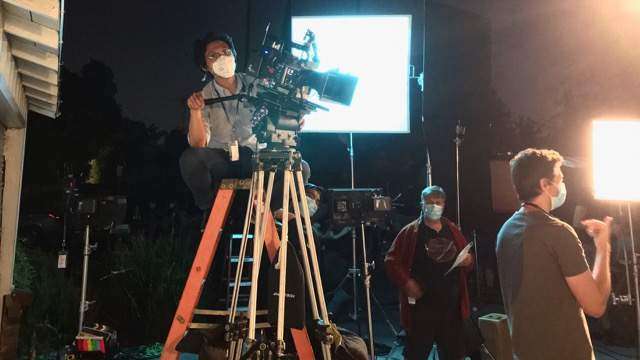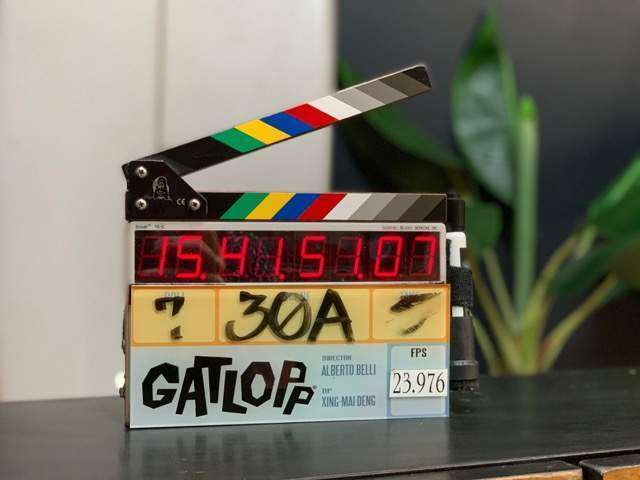
Currently the top 8th most popular movie on HBO, Gatlopp: Hell of a Game is a captivating mix of humor and fear. Paying homage to horror films of the 90s, this story of a group of friends trapped in a house together and forced to search their feelings of connection has a lot in common with what most of us went through during the pandemic; minus the supernatural component. The story behind this film is equally fascinating because it was one of the first productions allowed to go back to work during the lockdown. Not only does it stand as a momentous leader in Hollywood’s return to “normal” life but it was a part of establishing so many of the standard practices during the pandemic. Cinematographer Xing-Mai Deng and Director Alberto Belli ventured into new horizons with this production; a cumbersome and trepidatious endeavor to be sure but a necessary one still. Director Alberto Belli alludes to the positivity Xing-Mai brings stating, “Working with Mai is always exciting! He is very professional, has an impeccable eye, and always brings his excellent sense of humor that keeps the set fun. He is a DoP with visual proposals and solutions based on story rather than just what looks cool. He understands how to visually enhance the character’s arcs like very few DoP out there can.”
Artists need to create and will persevere at all costs to do so. The making of Gatlopp: Hell of a Game is a story within a story; one which testifies to the spirit of filmmakers who contributed immensely to those of us confined in our homes during this historic era. For those simply interested in the entertainment aspects of this film, there’s more than enough to enjoy. After nearly a decade of time apart, four old friends get together to reminisce and play a drinking-board game. As they become inebriated, they realize that this game has a supernatural component that is interacting with them and forbids them to leave until the game is completed. If the quartet fails to complete the game’s mission by sunrise, they will be locked in limbo forever. The juxtaposed plot is that the group will need to own up to what created the distance between them as well as how fulfilled they are by their own life trajectories. The insecurities and disappointments each possesses serves to drive the comedy of the plot. What the characters are faced with and how they choose to process or challenge these decisions reminds us all that a series of small mistakes can form a negative path. The main cast includes Jim Mahoney (writer of the Oscar nominated film Klaus, also writer of Gatlopp: Hell of a Game) as Paul, Emmy Raver-Lampman (of Netflix’s The Umbrella Academy and Apple+’s Central Park, both of which are Primetime Emmy Award–nominated) as Sam, Jon Bass (of the Oscar nominated Aaron Sorkin film Molly’s Game) as Cliff, and Sarunas J. Jackson (of HBO’s Primetime Emmy Award–winning Insecure).
As previously mentioned, the story behind this story is remarkable. Gatlopp: Hell of a Game was scheduled to begin production in October of 2019 but was delayed; a common occurrence in filmmaking. With a new start date in February of 2020, the cast and crew were prepared to begin work when a state-wide mandated shutdown was put into place. Six months later in August, the film was approved to begin production in October of 2020 but with the caveat that (as with all productions) Covid safety protocols would be strictly adhered to. Though happy to return to work, the makers of this film would need to reinvent their process. The first impediment was that new safety measures like PPE and Covid Compliance Officers were not factored into the budget that was set before the pandemic ever occurred. Cost cutting and increased efficiency was a necessity. Newly established work zones (for Covid safety) were in place that required cast members to exit the soundstage when the electrical and grip crew needed to step in to work; compounding the amount of time needed to capture each scene properly. DP Xing-Mai Deng communicates, “Covid safety protocols certainly changed a lot of things in filmmaking on set. The preparation became harder and slower with the stay-at-home order and the social distancing requirement. Usually things that could be done during a 1-hour sit-down meeting instead took us days because you just couldn’t sufficiently discuss visuals without drawing them together. Wearing masks on set also created difficulties in communication. Professionally, you would want to avoid speaking loudly on set but with the masks, you had to speak loudly in order for people to understand what you’re saying. We had to rely more on sign language to keep the voice level down, i.e., the communication for taking down this light would become: point at this lamp, cut the throat, so the G/E team would go take down that lamp. Despite all the limitations we had, we didn’t compromise the quality in order to make the day. We planned for all the shots, revised the plan if needed on the spot, and execute our design to successfully maintain the visual progression that we originally wanted. The level of execution would be considered very high even if there wasn’t a pandemic going on. For that, the final product of this movie was such a reward for me and the whole cast and crew.”
True to Xing-Mai’s word, there’s an exceptional quality to this film that belies the hindrances involved in its creation. In fact, the visual tone might be the most transfixing element in Gatlopp: Hell of a Game. The cinematographic style hearkens back to the horror classics of the 90s but it also possesses an update that bridges the “wink” of the story in terms of comedy. As with films of the 90s in this genre, nearly all of the action of this story takes place at night. Colors are associated with different characters and become something of an identity touchstone in the story. There are moments when Xing-Mai takes a basic color approach and then expands it with a full spectrum palette that signifies something is familiar and something is also quite modern. One of the most comedic and simultaneously tense moments in the film occurs in a split-screen discussion between a husband and his soon to be ex-wife. One of the main characters [Paul] is discussing the divorce he doesn’t want with wife Alice. Alice is pushing for the divorce and is seen at her boyfriend Andre’s mansion. As the call progresses, Paul realizes that the marriage is essentially over. Xing-Mai explains, “Alberto [director] and I designed the compositions and actor’s actions for this phone call scene. They were both always in frame so there were no cut-aways. Timing was extremely important. In reality, you could only shoot one side of the split screen first, and then shoot the other side. Due to the location availability, we had to shoot Paul’s side first, and then move on to the other location for Alice’s side. On set, while Alberto and the script supervisor Barbara timed the speed of the performance, I had to really think about and be careful of whether the shot angle worked here and would also be achievable at the counterpart location. I and the camera team had to measure the heights and the angles of each shot, so we could replicate it in the maximum way possible at the counterpart location for that character.” While truly remarkable, this scene is but one of so many which display the truly extraordinary design and execution in this film’s visual language. Though devised under oppressive circumstances, Gatlopp: Hell of a Game is a delightful film that will feed both the lighter and darker sides of your tastes.
